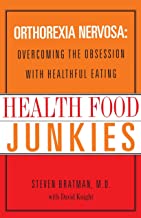Orthorexia Nervosa
Orthorexia, or orthorexia nervosa, is an eating disorder that involves an unhealthy obsession with healthy eating. Unlike other eating disorders, orthorexia mostly revolves around food quality, not quantity. Unlike with anorexia or bulimia, people with orthorexia are rarely focused on losing weight (1).
Cluster Number:
Wiki Number: PW146
Diagnosis: Orthorexia Nervosa
US Patients:
World Patients:
Sex Ratio:
Age Onset:
Brain Area:
Symptoms: obsessive preoccupation with eating healthy food; the quality of food vs. amount of food eaten; more restrictive over time
Progression: may lead to excluding different classes of foods to unhealthy eating and weight “over-control”
Causes: increased viewing of Instagram where “food” is a frequent choice of topics, vs. other electronic messaging platforms
Medications:
Therapies: This is not (yet?) recognized in the 2013 “Diagnostic and Statistical Manual” as a disease.
Youtube Video: Orthorexia Explained (Orthorexia Nervose)
Amazon or Library Book: Health Food Junkies
Click the book to link or order from Amazon.

